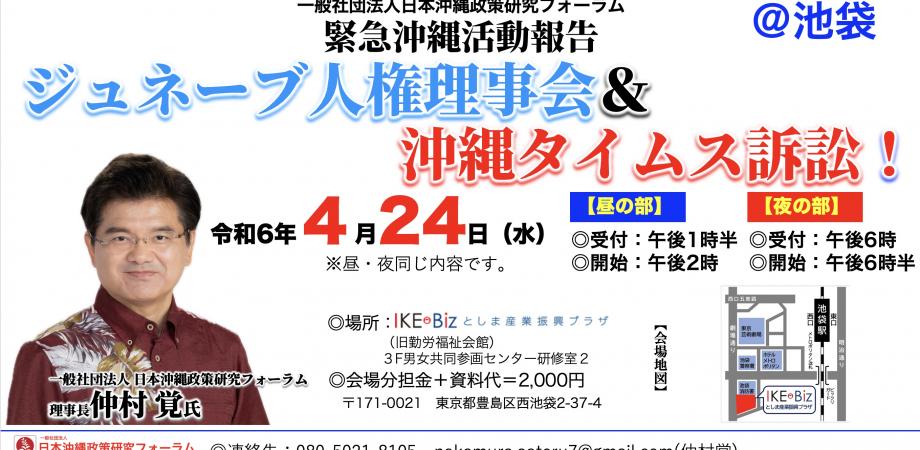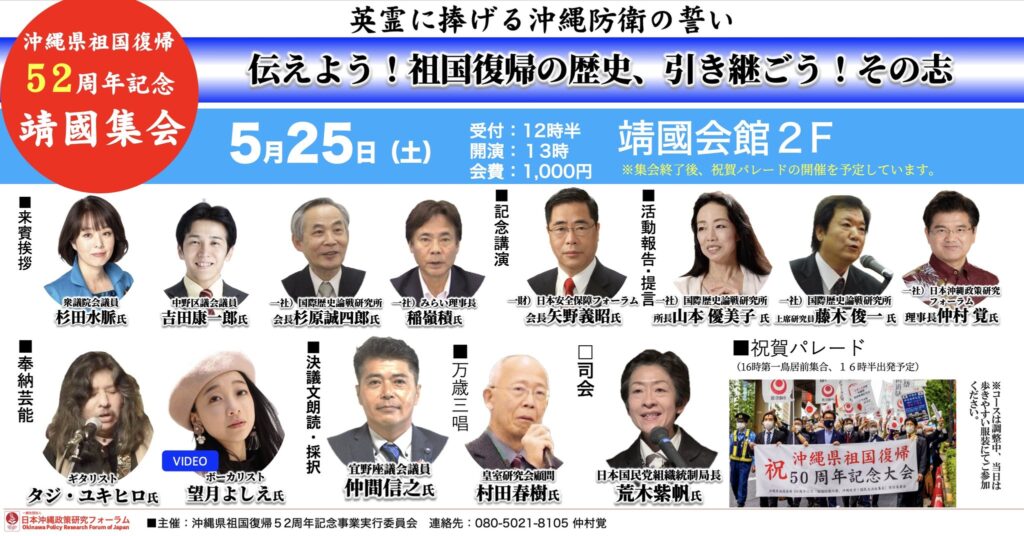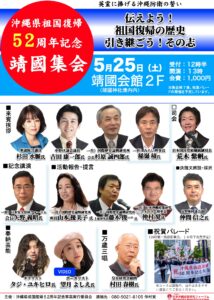【日本語】https://i-rich.org/?p=1832
Feb 2024
Nakamura Satoru, Senior Researcher at the International Research Institute of Controversial Histories
Revolutionary struggle that shifted from anti-war peace movement to anti-discrimination struggle
There is a new key phrase that started to be used after Okinawa’s Henoko struggle began in the 2010s. That is “Okinawa discrimination.” It argues that “the importance of the U.S.-Japan security alliance is understandable, but it is impermissible to overly burden Okinawa when it comes to the U.S. military bases in Japan.” It does not instigate the Okinawans to fight against the U.S.-Japan security but to instigate them to embrace the feeling that discrimination is impermissible.
To brew the sense of being unduly discriminated, they made up stories like “disposal of Ryukyu” and “sacrificed Okinawa during World War II” and claim that “Okinawa has been constantly under the discriminatory colonial rule by Japan to this day.”
In addition, a new term, “structural discrimination,” began to be used, asserting that people outside Okinawa Prefecture treat Okinawa discriminatorily without realizing the discrimination solely for the sake of national interest. They present the goal of their movement: for the future of Okinawa, the only action to be taken against the discrimination is to recover Okinawa’s right to self-determination.
In other words, the movement against the U.S. bases in Okinawa has completely shifted from “anti-war peace movement,” to “anti-discrimination struggle.”
Anti-discrimination struggle using the United Nations recommendations
The United Nations Human Rights Committee and the Committee on the Elimination of Racial Discrimination have been issuing recommendations to the Japanese Government that “the Japanese Government should officially recognize the Okinawan people as indigenous and duly protect their rights,” for six times in total since 2008. The Japanese Government has been arguing against the recommendation each time. However, the fact that the United Nations has been repeatedly sending the same recommendation means that the United Nations firmly believes that the Okinawans are indigenous people. What is dangerous about this recommendation is that it coincides with the “Declaration on the Rights of Indigenous Peoples,” which was passed by the United Nations in 2007 and approved by Japan. Article 30 of the Declaration states, “(1) Military activities shall not take place in the lands or territories of indigenous peoples, unless justified by a relevant public interest or otherwise freely agreed with or requested by the indigenous peoples concerned,” and in the case of conducting military activities there, “(2) States shall undertake effective consultations with the indigenous peoples concerned, through appropriate procedures and in particular through their representative institutions, prior to using their lands or territories for military activities.” In terms of the United Nations recognition, if the Okinawans say that they don’t need a U.S. military base in Okinawa, the Japanese Government that fails to take the relevant measures will be regarded as violator of the United Nations “Declaration on the Rights of Indigenous Peoples.”
In addition, China has been disseminating propaganda both domestically and abroad, claiming that “Ryukyu has been a member of the Chinese people ever since the ancient times and continuing independence movement from Japan and the United States and the Chinese people must support it.” In the event of a Taiwan emergency, it is highly probable that this anti-discrimination movement may give China a very good excuse for meddling with Okinawa’s sovereignty or really interfering in Okinawa.
The Japanese mass media provoke class struggle, using the ambiguously defined hate speech
The Japanese Government has been making dangerous laws and acts one after another. Typically, there is the so-called “Elimination of Hate Speech Law.” The official appellation goes, “Act on the Promotion of Efforts to Eliminate Unfair Discriminatory Speech and Behavior against Persons Originating from Outside Japan.” This is a conceptual law without penalty, aiming to cope with discriminatory speech and behavior committed in Japan against persons originating from outside Japan and others whom the Japanese Government recognizes as minorities in Japan, namely, Ainu people and Korean residents in Japan. The aim to eliminate discriminatory speech and behavior cannot be denied, but this is a highly risky act prone to misuse and in fact, it is being wrongly used.
The Act defines the term “hate speech” as discriminatory speech and behavior against persons originating from outside Japan. However, in daily circumstances, the term “hate speech” is used not only for discriminatory speech against persons originating from outside Japan but hate speech for anyone. Although Human Rights Protection Agency of the Ministry of Justice cites cases of “hate speech,” there is no clear definition. After asking the Legal Affairs Bureau to clarify the definition, the response was that they were not in the position to refer to the use of the term “hate speech.” That was a refusal of response, indeed.
Therefore, despite the fact that Okinawans are not persons originating from outside of Japan, the phrase “Okinawa hate” is all over the place. Based on such circumstances, “Ordinance aiming to create a society without discrimination against Okinawa Prefecture” was put into effect in April 2023, stating “The Prefecture shall take measures to eliminate unfair discriminatory speech and behavior due to being citizens of Okinawa Prefecture.” Based on these Act and Ordinance, some people and mass media started to target those who criticize the method and action of the anti-discrimination struggle, making up imaginary discrimination and throwing accusations like “X committed discrimination,” “Y’s speech is hate speech,” and so on, and went too far against anyone who asked for better ways to cope with the issue.
How to fight “public opinion war” regarding Okinawa
In the teaching creed of the Chinese People’s Liberation Army, “three wars” are advocated: “public opinion war,” “psychology war,” and “law war.” The People’s Liberation Army defines them as “combat actions committed based on the Central Military Committee’s strategic intention and operative missions.” These three wars are closely interrelated, but the most important one, with the strongest political impact concerning Okinawa now, is the “public opinion war.” And in the recent years, a public opinion war based on the story that “the people in Ryukyu have been discriminated since the era of the Ryukyu Kingdom and that Okinawa is about to be turned into a battleground once again. To evade the imminent war, Okinawa must regain its right to self-determination.” Unfortunately, Japan at present has no capable organ of intelligence, including the Self-Defense Forces, to carry out defensive operation against the public opinion war. Against the Chinese “three wars,” there is no alternative but for civilians to stand up and fight. In addition, now that the threat of a Taiwan emergency is looming, the public opinion war in Okinawa is the front of national defense.
Moreover, behind the public opinion war, the United Nations recommendation that Okinawan people are indigenous has been issued. Although this recommendation is the most vital matter directly concerning the Okinawan people’s identity, it has been so cunningly concealed that the Okinawans are totally unaware of it. The reason for the perfect concealment is that since 99% or more of the Okinawans identify themselves with the Japanese, instigators fully understand that they will fail, should the Okinawans be informed of their attempt.
Here is a hint to favorably fight the public opinion warfare, despite the adverse position Okinawa is now in. If Okinawan people are widely informed of the existence of this recommendation and the purpose and danger of the “anti-discrimination struggle,” this very issue could be brought to the election focal point, stating, “Those of you who regard yourselves as indigenous people, vote for that candidate, and those who think you are Japanese, vote for this candidate!” Then, things will completely change to your advantage. In addition, the power promoting anti-discrimination struggle with the convenient tool called “hate speech” will no longer be able to accuse those who say, “We are Japanese. The U.N. recommendation is wrong!” nor criticize it as “hate speech.”
However, most of the television and newspaper media stand on the side of the “anti-discrimination movement” and the activities on our part in the public opinion warfare are restricted to the Internet, handing out brochures, and making street speeches. However, if for the Okinawans who are merely 1% of the total Japanese population, the rest of 99% Japanese across Japan should fight in patriotic unison, the Okinawans will awake, and I am confident that we can win in the Okinawa public opinion war. We hope that the entire Japanese people will recognize this issue and act promptly for our country.



